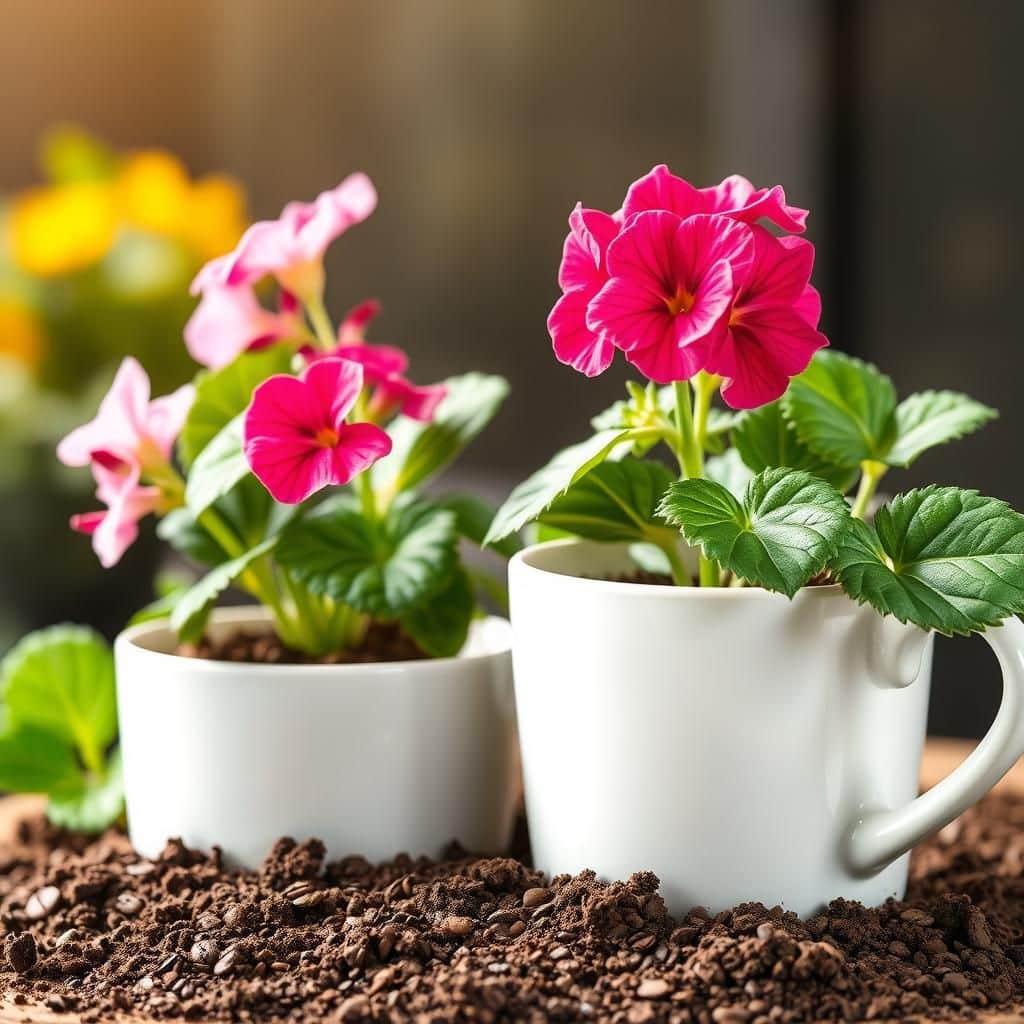Do Coffee Grounds Help Geraniums? Discover the Benefits for Your Plants

Coffee grounds are often touted as a gardening secret, particularly when it comes to nurturing resilient and vibrant plants like geraniums. As organic material, coffee grounds provide essential nutrients, improve soil structure, and enhance drainage, making them an attractive option for plant enthusiasts. But do they truly benefit geraniums? In this article, we'll explore the advantages of using coffee grounds in geranium care, examining their potential to boost growth, attract beneficial organisms, and even deter pests. Join us as we uncover the truth behind this common kitchen waste and its impact on your garden's flourishing geraniums.
Do Coffee Grounds Benefit Geraniums?
Using coffee grounds as a supplement for geraniums can be beneficial due to their rich composition of nutrients. These grounds serve as a natural fertilizer, providing essential nitrogen, phosphorus, and potassium, all of which contribute to plant growth and flower development. Additionally, the organic matter in coffee grounds improves soil structure, promotes better drainage, and increases the soil's moisture retention, ultimately leading to healthier geraniums. However, it's essential to use coffee grounds in moderation, as an excessive amount may lead to soil acidity, which can negatively affect the plant.
How to Use Coffee Grounds for Geraniums
Applying coffee grounds to geraniums can be done in several ways. You can mix the grounds into the soil before planting to enhance soil quality or sprinkle them around the base of established plants. Another method is to make a compost tea by steeping coffee grounds in water and then using this nutrient-rich solution to water geraniums. Regardless of the method chosen, ensure that the coffee grounds are well-integrated into the soil to prevent any mold growth, which can harm the plants.
The Nutritional Benefits of Coffee Grounds
Coffee grounds are an excellent source of essential nutrients for geraniums. They contain viable amounts of nitrogen, which promotes leaf growth, and phosphorus, essential for root and flower development. Additionally, the presence of potassium helps improve overall plant health by enhancing disease resistance and promoting better nutrient absorption. Incorporating these nutrient-rich grounds into the soil can significantly boost the health and vibrancy of geraniums.
Potential Risks of Using Coffee Grounds
While coffee grounds offer numerous benefits, there are potential risks to consider. Overapplication can lead to increased soil acidity, which may not be suitable for geraniums as they prefer slightly acidic to neutral soil conditions. Additionally, using too many coffee grounds can create a dense layer on the soil surface, inhibiting water penetration and air circulation, ultimately harming the plants. Therefore, it is crucial to monitor the amount of coffee grounds used and adjust based on the plants' responses.
Other Uses of Coffee Grounds in Gardening
Beyond geraniums, coffee grounds serve multiple purposes in gardening. They can be used as a natural insect repellent, deter pests like snails and slugs, or as an organic mulch to help retain soil moisture. Additionally, coffee grounds can be added to compost piles to enhance nutrient content and can also be beneficial for other acid-loving plants such as blueberries and rhododendrons. Such versatile applications make coffee grounds a valuable resource in any gardener's toolkit.
Composting Coffee Grounds
Composting coffee grounds is an effective way to recycle this organic material while enriching garden soil. When composted, coffee grounds break down into a rich, nutrient-dense humus that improves soil fertility. They can be combined with other compost materials, such as kitchen scraps and yard waste, to create a balanced compost that provides a wide range of nutrients. Ensuring that coffee grounds make up only about 20% of the compost pile is vital to maintain proper carbon-nitrogen ratios and prevent compaction.
| Benefit | Description |
|---|---|
| Rich in Nutrients | Coffee grounds provide nitrogen, phosphorus, and potassium beneficial for plant growth. |
| Soil Improvement | Enhances soil structure, promotes better drainage, and moisture retention. |
| Natural Pest Repellent | Can deter pests like snails and slugs when applied around plants. |
| Increased Composting Efficiency | Boosts the nutrient content of compost, promoting healthier plants. |
| Acidity Balance | Can alter soil pH, so use sparingly to avoid excess acidity. |
How do you use coffee grounds for geraniums?
:max_bytes(150000):strip_icc()/using-coffee-grounds-in-your-garden-2539864_FINAL-025580b008314747ad1a5d6411baf988.png)
Using coffee grounds for geraniums can provide numerous benefits for these flowering plants. Coffee grounds are rich in nutrients and can improve the soil's texture and drainage. Here’s how you can effectively utilize coffee grounds for geraniums:
Benefits of Coffee Grounds for Geraniums
Coffee grounds offer several advantages when used in the garden. They are a natural source of nitrogen, which is essential for plant growth and can promote lush green foliage in geraniums. Additionally, coffee grounds can help enhance soil structure and increase microbial activity, leading to healthier plant roots. The benefits include:
See also:
- Nutrient-Rich Soil Amendment: Provides essential nutrients like nitrogen, phosphorus, and potassium.
- Improved Soil Drainage: Enhances the texture of the soil, helping with aeration and drainage.
- Pest Deterrent: Acts as a barrier against certain pests due to its bitter taste.
How to Apply Coffee Grounds
To use coffee grounds effectively, you can either mix them directly into the soil or use them as a top dressing. The application process is straightforward:
- Direct Mixing: Mix a handful of used coffee grounds into the soil around the geraniums, ensuring to work them into the top few inches.
- Top Dressing: Sprinkle coffee grounds evenly on the soil surface around the plants.
- Watering: Follow up with watering to help the grounds integrate into the soil.
Frequency of Application
The frequency of applying coffee grounds can vary based on the condition of the soil and the needs of the plants. It’s crucial to avoid overapplication:
- Monthly Addition: Applying coffee grounds once a month is generally sufficient.
- Observe Plant Health: Monitor plants’ growth; if they appear lush and healthy, you are likely applying the right amount.
- Seasonal Usage: Utilize coffee grounds predominantly during the growing season (spring and summer).
Cautions When Using Coffee Grounds
While coffee grounds provide many benefits, there are a few precautions to keep in mind to prevent potential issues:
- Avoid Excessive Use: Too many coffee grounds can lead to soil acidity, which may not be suitable for all plants.
- Cleanliness: Ensure the grounds are free from additives such as sugar or dairy products before use.
- Observe Effects: If you notice any adverse effects on your geraniums, reduce the frequency of application.
Alternative Uses for Coffee Grounds
Besides using them for geraniums, coffee grounds can serve multiple functions in gardening:
- Composting: Add coffee grounds to your compost heap to enrich it.
- Fertilizer for Other Plants: Use grounds on vegetables or other flowering plants.
- Pest Control: Scatter coffee grounds around plants to deter snails and slugs.
What is the best fertilizer for geraniums?

The best fertilizer for geraniums primarily depends on their growth stage and specific needs, but a balanced fertilizer with an N-P-K ratio of around 15-30-15 is often recommended. This type of fertilizer provides a higher level of phosphorus, which is essential for blooming and root development. Additionally, using a slow-release granule or a liquid fertilizer will also promote healthy growth throughout the season. Regular feeding, especially during the growing season, enhances flowering, foliage strength, and overall plant health.
Understanding Geranium Nutrient Needs
Geraniums require a variety of nutrients to thrive, with the most critical being nitrogen, phosphorus, and potassium. These main nutrients support various aspects of plant development:
- Nitrogen: Promotes healthy leaf and stem growth.
- Phosphorus: Essential for strong root systems and vibrant blooms.
- Potassium: Enhances overall plant health and resistance to diseases.
Types of Fertilizers Suitable for Geraniums
There are various types of fertilizers available for geraniums, and understanding their differences can help gardeners make the right choice:
- Granular fertilizers: These are slow-release and ideal for long-term feeding.
- Liquid fertilizers: They provide immediate nutrient uptake for faster results.
- Organic options: Such as fish emulsion or seaweed extracts, promote healthy growth while being environmentally friendly.
Application Timing for Fertilizing Geraniums
Applying fertilizer at the right time can significantly affect the growth and blooming of geraniums. Here are the best practices for timing the application:
- Early spring: Start fertilizing as new growth appears.
- Throughout summer: Continue every 4 to 6 weeks during the growing season.
- After blooming: Reduce fertilization when the plant’s flowering period ends.
Common Signs of Nutrient Deficiency in Geraniums
Recognizing nutrient deficiencies can help mitigate issues before they affect the plant severely. Keep an eye out for:
See also:
- Yellowing leaves: Often a sign of nitrogen deficiency.
- Stunted growth: Can indicate a lack of various nutrients, particularly potassium.
- Poor flowering: Suggests inadequate phosphorus levels.
Tips for Successful Fertilization of Geraniums
Implementing effective fertilization strategies can enhance the growth and flowering of geraniums:
- Follow instructions: Always adhere to the fertilizer’s recommended application rates.
- Water after application: Helps distribute nutrients evenly and prevents root burn.
- Monitor plant health: Adjust fertilization practices based on the plant's response.
What plants should I not put coffee grounds on?

Coffee grounds can be a great addition to many gardens, but there are certain plants that should not be subjected to this organic material. Below are some plants that do not benefit from the application of coffee grounds and can actually be harmed by it.
1. Plants Sensitive to Acidic Soil
Coffee grounds are inherently acidic, which can alter the pH balance of the soil. Certain plants thrive in neutral or alkaline conditions and may suffer if coffee grounds are added.
- Asparagus: This plant prefers a pH around 7 to 8 and coffee grounds can disrupt its growth.
- Beets: Beets grow best in neutral pH, making them sensitive to the acidity from coffee grounds.
- Cabbage: Similarly, cabbage prefers a more neutral soil and can become stressed if exposed to too much acidity.
2. Plants That Require Decreased Nitrogen Levels
While coffee grounds are a good source of nitrogen, certain plants do not appreciate high nitrogen levels and can become leggy or weak.
- Tomatoes: Excess nitrogen can lead to lush foliage but poor fruit production.
- Peppers: Like tomatoes, peppers thrive best with balanced nutrient levels and can be adversely affected by high nitrogen.
- Carrots: Carrots may develop a less desirable texture when nitrogen is over-supplied from coffee grounds.
3. Plants with Poor Drainage
Adding coffee grounds can compact the soil and reduce drainage, which is detrimental for certain plants that require excellent drainage to thrive.
- Succulents: These plants are sensitive to overwatering and poor drainage, so coffee grounds can be harmful.
- Peonies: They prefer well-drained soil, and heavy coffee ground applications may hinder growth.
- Bulbs: Certain bulb plants, like tulips and daffodils, need fast-draining conditions and can rot if the soil retains too much moisture.
4. Plants That Could Attract Pests
Some plants are more susceptible to pests that thrive in conditions altered by coffee grounds. The addition of coffee grounds may unintentionally attract unwanted insects.
- Squash: Coffee grounds can attract pests like squash bugs, which can damage the plant.
- Beans: These can be susceptible to root rot if coffee grounds create overly moist conditions.
- Melons: Coffee grounds can create a haven for pests such as aphids, which pose a risk to melons.
5. Plants Known for Their Phytotoxicity
Certain plants naturally produce chemicals that inhibit growth in surrounding vegetation. Coffee grounds can exacerbate these issues.
- Black Walnut: Known for its allelopathic properties, adding coffee grounds can further harm the growth of nearby plants.
- Ragweed: This plant can inhibit the growth of other plants, and coffee grounds might not help.
- Goldenrod: Similarly, goldenrod may exhibit growth-inhibiting effects that can be worsened by the acidity of coffee grounds.
Questions from Our Readers
Do coffee grounds really benefit geraniums?
Coffee grounds can enhance the growth of geraniums by providing essential nutrients. They are rich in nitrogen, which is crucial for plant development. Additionally, when mixed into the soil, they can improve drainage and help maintain moisture levels, creating a better environment for geraniums to thrive.
How should I apply coffee grounds to geraniums?
To use coffee grounds effectively, sprinkle a thin layer around the base of the geranium plants. It’s important to mix the grounds into the soil to avoid compaction, which could restrict water and nutrient absorption. Applying coffee grounds every few weeks can help keep the soil fertility in check.
See also:
Are there any risks of using coffee grounds on geraniums?
While coffee grounds can be beneficial, using them in excess may lead to acidity issues in the soil, which might not be suitable for geraniums that prefer neutral to slightly acidic conditions. It's best to use them in moderation and monitor the plants for any signs of distress.
Can coffee grounds repel pests from geraniums?
Yes, coffee grounds can act as a natural pest repellent. The caffeine in the grounds can deter certain insects, making them less likely to infest geraniums. However, it's important to combine this method with other pest control strategies for optimal results.

If you want to read more articles like Do Coffee Grounds Help Geraniums? Discover the Benefits for Your Plants, we recommend you check out our Plants category.
Leave a Reply
Related Articles